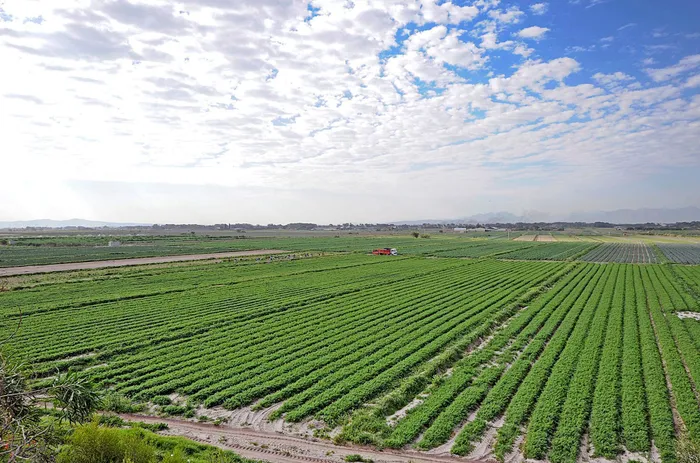Agriculture Department rejects claims of regulatory collapse in fertilisers and farm feeds
AGRICULTURE

The Department of Agriculture has rejected claims about extreme delays in processing registrations and applications; blocking of new technology and essential products raised by agricultural association Southern African Agri Initiative (SAAI).
Image: Leon Lestrade/Independent newspapers
The Department of Agriculture (DoA) has dismissed claims by the Southern African Agri Initiative (Saai) that the regulatory system responsible for approving fertilisers, pesticides, farm feeds and veterinary products is facing a “total administrative breakdown.”
This follows a strongly worded letter of demand sent by Saai’s attorneys to the Minister of Agriculture, the department, and the Registrar of Act 36, calling for urgent intervention.
In its statement, the department on Monday said it had taken note of what it described as “misleading public statements” made by an agricultural lobby group regarding delays and inefficiencies in processing applications governed by the Fertilisers, Farm Feeds, Agricultural Remedies and Stock Remedies Act.
It stressed that despite challenges, the system was not in a state of collapse.
“Upon assuming office, the Minister of Agriculture, John Steenhuisen, indicated that the backlogs and inefficiencies around the process would receive attention," said the department.
"The department has made significant inroads in modernising the regulatory framework for agricultural inputs under the Fertilisers, Farm Feeds, Agricultural Remedies and Stock Remedies Act, 1947, moving decisively to enhance efficiency and transparency.”
While acknowledging that delays do occur, the department rejected assertions that the regulatory environment is failing.
"We take note that a narrative is being driven regarding “persistent collapse”, and that nothing is being done to address the situation. We have also noted the Letter of Demand from the attorneys of Saai, in which various hyperbolic references are made, which are regrettable,” it said.
According to the department, the directorate handling Act 36 matters processed and finalised 6 617 applications in the 2024/25 financial year.
Over the past five years, 51 165 applications have been finalised out of 56 890 received. Current turnaround times range from two weeks to 24 months depending on product type, the department said.
A key improvement is the digital application system for pesticides, launched in December 2023. It enables companies to submit applications online, track progress in real time, and access public lists of registered products. The system replaces the long-standing manual process that required applicants to file paperwork in person.
Steenhuisen said the digital platform is helping reduce unnecessary delays by enhancing workflow and better serve stakeholders.
“Previously, applicants had to travel to DoA offices to file paperwork manually, a lengthy and often frustrating process. By going digital, the department is eliminating unnecessary delays and creating a ‘fast track’ for companies that comply with requirements from the start,” he said.
The department also confirmed that manual pesticide applications will no longer be accepted from 1 April 2026, with the digital system set to expand to other categories of regulated products.
Although the total backlog across four major categories stands at 5 730 applications, the department emphasised that the majority—4 815—require scientific and technical evaluation. Two key scientific posts are currently vacant due to resignations, a gap it says is being urgently addressed.
"This again highlights that the department is not experiencing an “administrative breakdown”, but rather an increasing capacity crunch in terms of the scientific and technical evaluation of applications.”
However, the Saai remains adamant that the situation is deteriorating.
Francois Rossouw, CEO of Saai, said Act 36 has been dysfunctional for more than a decade, citing the 2011 Ministerial Task Team Report which flagged severe governance failures.
“Over more than a decade, the regulatory office (the office of the Registrar of Act 36) has suffered serious dysfunction, as previously flagged in a Ministerial Task Team Report of 2 September 2011," he said.
"However, this has now grown into an even more serious failure in basic governance.”
He listed a litany of concerns including extreme delays, outdated paper-based systems, insufficient qualified staff, blocked access to new technologies, and a “clogged” registration pipeline.
Rossouw added that Saai has instructed its attorneys to direct a Letter of Demand to the department and the minister.
He said Saai members are reporting severe bottlenecks, with some applications allegedly stuck in the system for more than six years.
"There are critical agricultural and veterinary products that have been stuck in the Registrar’s backlog for years. Many of these applications involve proven technologies and alternatives to older remedies that are already approved and widely used in other countries," he said.
"The real issue is that in South Africa, these applications aren’t even being processed. This is not just a delay - it is a total administrative breakdown that blocks progress, sustainability, and competitiveness.”
BUSINESS REPORT